#its just dismissing plot and character development and trauma for some laughs that for the most part you arent even gonna get
Explore tagged Tumblr posts
Text
Why You Should Watch SKET Dance
Why You Should Watch SKET Dance
If I were to tell you what I took away from SKET Dance from old lessons to new, I would say that it said something along the lines of this:
“You are not the mistakes you made in the past. You are not defined the person you were before. If anything, the past is something that you cannot change, but you can surpass those regrets and try to change for the better. Trauma is something that cannot be left behind, but it can get better, especially when you are surrounded by the right people and support. Helping people doesn’t always change the world, but it can change the world of that person and maybe even yours.”
That cheesy quote took a while to write (so did this whole post), but that’s because I wanted to get it right. I wasn’t even sure where to start with this post of sorts.
I will warn ahead of time that if you aren’t familiar with anime, SKET Dance might be an overreach. It does have some references that are niche, and it has a lot of “manzai” (tsukkomi/boke) jokes with tons of mentions. There is fanservice, but no more than you’d see in some of the other series that were released under Shonen Jump. Sometimes the humour and everything can be a little cringy, but I think that’s a given with the fact that you are watching anime.
(This is spoiler-free, gluten-free, no trans fat, and took me too much time.)
Story
I get that it’s like Gintama, but I wouldn’t say it’s a “poor man’s Gintama”. Instead, take it for what it is. It’s like comparing a younger sibling to the older sibling. You’re not letting SketDan shine on its own, and it deserves to.
SketDan has a really simplistic story. It’s about a school club that wants to help people. There is no big war, massive battles, or over-the-top villain that needs to be crushed. I can’t say that it’s episodic, but it definitely leans towards the more “slice-of-life” approach. It has its own arcs that come one after another in good bits and pieces. This series balances itself so well with its drama and comedy. The backstories were done so well, and they didn’t even get to all of them! In fact, one of the best ones was left just in the manga.
The story is made by the characters. It doesn’t rely on the environment or the world around them. Instead, the world to them are the people they are surrounded by. No aliens, samurai, ninjas, or great big event, it’s just them, their high school, and their unconventional club.
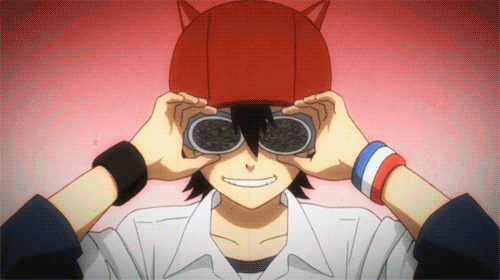
Characters
This has got to go down as one of the best ensemble trios in anime. All of them do get their time to develop, and they balance each other out so well. You’d think these characters were friends for their entire lives. I can’t even say who’s the best because I think they’re all the best!
Bossun is a sensitive guy who’s insecure about being the main character of this series (yes, he does mention that). He doesn’t have any spectacular “Shonen Jump” skills. He has no “bankai”, “rasengan”, or “Kamehameha”. He has a hat and goggles. His power is concentration. These are completely valid reasons to be worried about your character status because, on the surface, Bossun sounds downright pathetic (and he knows it). But through the story, you get to see why he’s actually one of the best main characters out there (even if the cast doesn’t want to acknowledge it).
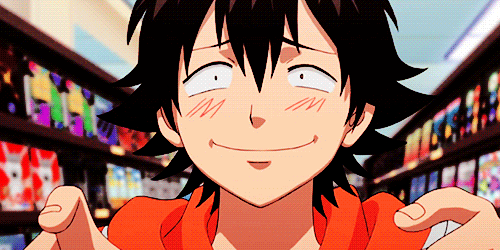
Himeko is one of the coolest characters in this series. I haven’t seen a weapon of that kind… ever. She isn’t afraid to slap the stuff out of anyone and will do anything for a friend. I don’t want to get into her character too much due to spoilers, but it’s revealed early on that she is quite legendary. She’s quite important for the humour of this story. It’s often brought up that she’s the “tsukkomi” (the one who responds to the “boke” stupid).
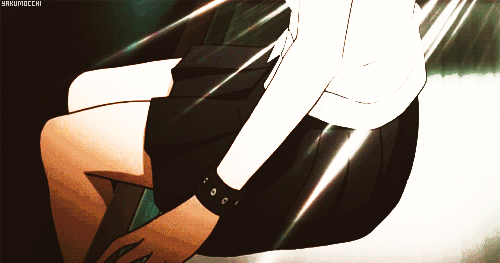
Last but not least of the great trio, we have Switch. This is probably the character I was most blindsided by. Even though I knew his backstory beforehand (nobody stops me from clicking from “show spoiler” button, it’s quite a problem). He’s the local otaku and database. And he’s probably the most observant. Even though he never “talks”, he’s one of the funniest characters in the series even when he isn’t in the limelight. I legally cannot dig into more about his character due to spoilers. You really need to see it for yourself.
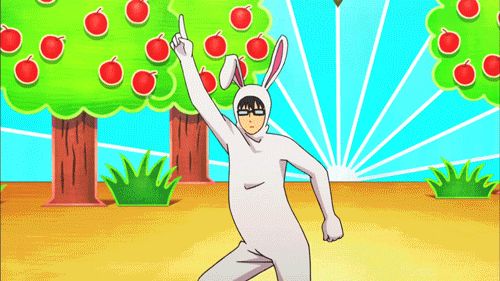
The supporting cast is nothing to put aside either. A lot of them become more and more important as time passes, and the roles they play soon play right into the main plot of the story. We’ve got someone who speaks in “yabasu”, a ghostly occult member, a samurai, a captain, a tsundere, a visual kei star who doesn’t speak in any actual language, a 1.8m tall woman who can literally murder you with a slap, a voice actress idol movie star, and a teacher who makes drugs and bombs. That doesn’t even touch on the student counsel. Anyways, discovering these characters is part of the charm.
Art
There are too many good faces in this anime. While the art isn’t always consistent, it’s never “bad”.
The faces in this anime are on-par with other comedy anime. This is just the tip of the iceberg.
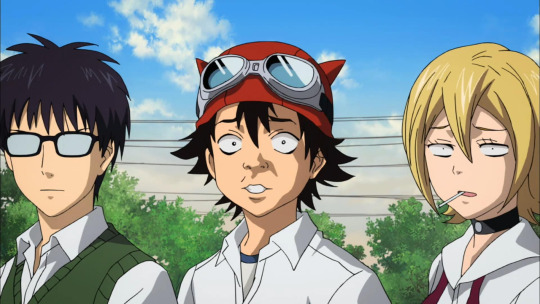
Music
*downloads all the music*
I’m going to pretend like I haven’t listened to some of these on repeat since I finished the anime. Not all anime will literally have a designated band that are made after the characters. That was a really nice touch. There are a ton of special insert songs that go with certain arcs too.
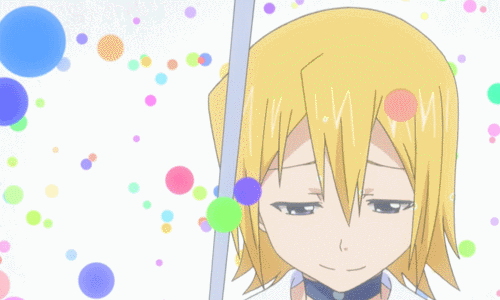
SKET Dance is like any other anime in a way. It benefits from having a good OST. A good OST will add to the story. It will add to the anime, and it will convey all the right feelings. It helps with the comedy, the drama, and the random “what am I watching” moments.
Seiyuu
I wanted to save this category for last. This anime actually changed the way that I look at all the main seiyuu of this anime. It’s not that often that the Vomics (voice acted comics) have the same cast as the anime. They fit their characters so well, and I really can’t express that enough. I associate their voices with their character. It’s like how you can look at a picture of your favourite character and remember exactly what they sound like (or maybe that’s just me).
I haven’t actually heard a lot of lead roles by Hiroyuki Yoshino because he has such a uniquely odd voice. I think the last anime I watched where he actually played the protagonist was Kekkaishi which was quite a while ago. He did well for that role too. Another anime where he played one of the main characters was in Hai to Gensou no Grimgar which didn’t have a very enjoyable cast compared to other anime including SKET Dance (but still worth checking out if you like tamer isekai). I’ve also seen him play a suave character, but I actually skipped most of his lines going, “Not this again.” Present Mic is a character that he seems to be popular for, but those specific niche characters didn’t give him nearly the range that Bossun did. From the moments we were laughing with him and at him to the serious moments that really made me go quiet, it felt like he was truly the character.
Ryouko Shiraishi is such an underrated seiyuu. She admits that she doesn’t have a very cutesy voice, and due to that, the number of female characters she can play goes down, but I wouldn’t dismiss how great she is. For one, she’s really good at the Kansai dialect. Second, she plays a lot of younger male characters. She makes Himeko really cute but also really tough and spunky. She carries a lot of the humour as the reactor “tsukkomi”. And if you’ve watched Demon Slayer, she plays one of the demons and is so good at it. I really like her unique voice because it deviates from the norm just like Himeko’s character.
Gintoki—I mean Tomokazu Sugita is great as Switch, and even though sometimes we forget that he’s a legitimate voice actor who can actually voice act and not just scream on command. Of course, he’s funny. That goes without saying. Almost all of his well-known characters are known for being funny. Even the guy in real life is really funny. I’m not sure how much explanation would be needed for him.
Summary
Overall, I had such a good time with this anime. It made me laugh, feel the feels, and really smile (I mean the type that people really ask you what the heck you’re watching because you’re smiling like you just watched someone you hate fall down the stairs). It reminded me of what I liked from comedy anime, but it also reminded me what I like about anime that take it to basics with just its characters. Actions and battles are good once in a while, but the characters are the heart, soul, and being of this anime. If you’re looking for a good laugh or smile with a ton of gags and jokes with a great ensemble cast, look no further! SKET Dance is here!
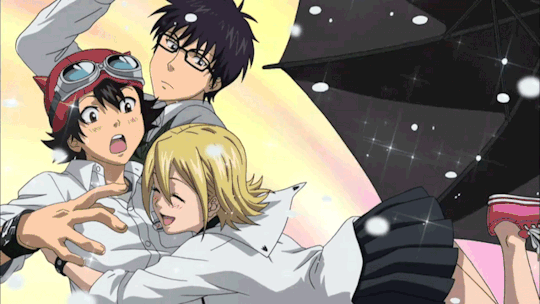
I’m going to recommend this anime to anyone who has read this, @azroazizah, @brettyblease, @tsukiomoon, and anyone else who likes those Shonen Jump shenanigans.
P.S. It is totally worth picking up the manga after watching the anime.
76 notes
·
View notes
Text
2020 in books
2020 was a year of changed reading habits; people reading more than ever or not at all, some changing their tastes and others turning to old comforts. While there weren’t any huge overhauls on my end, more free time did mean a total of 32 in a wider range of genres. In the past couple of years I found a lot of the things I read to be kind of middling and ranked them accordingly, but this year had some strong contenders in the mix. With college officially behind me I love nonfiction again, and I really need to stop being drawn in by novels with long titles that ‘sound interesting.’ A piece of advice to my future self: they will only make you angry.
The Good
The Idiot by Fyodor Dostoevsky I loved the BBC radio play when I first listened to it back in 2017, but didn’t know if I could stomach the idea of actually reading the 700-page book, especially since I already knew the plot (spoiler alert: this had no effect and I gasped multiple times despite knowing what was going to happen; Fyodor’s just that good at atmosphere.) The story follows Prince Lev Myshkin, a goodhearted but troubled man entering 1860s Petersburg high society and meeting all of the wretched people therein as he navigates life, laughs, love, unanswerable questions of faith, and human suffering. I care about it in the same way I think other people care about reality TV shows and soap operas. I’m so personally invested in the drama and feel so many different emotions directed at these clowns that it’s like being a fan of Invitation to Love (with an ending equally upsetting to that of the show ITL is from, Twin Peaks.)
Salt: A World History by Mark Kurlanksy I adored this book. The first half reads a little like a Wikipedia article, and I was worried that it was leaning too clinical and would be disaffected with colonialism and indigenous peoples, but even that oversight is corrected for as the text goes on. It’s not going to be for everybody because it really is just the world’s longest encyclopedia entry on, well, salt, but it’s written with such excitement for the topic and is so well-researched and styled for commercial nonfiction that I think it deserves any and all praise it’s gotten. We have to talk about that time Cheshire was literally sinking into the ground, and companies who were over-pumping brine water to steal each other’s brine water said ‘no it’s okay it’s supposed to that’ so were legally dismissed as suspects.
Midnight Cowboy by James Leo Herlihy Cried. 10/10. The plot of Midnight Cowboy is very classic and actually has a lot in common with The Idiot, as 20-something Joe Buck moves from the American Southwest to NYC and meets myriad challenges as a sex worker. I’ve been obsessed with the movie for a few years now and the book made me appreciate it anew; I think it’s rare for an adaptation to take the risk of being so different from its source material while still capturing its spirit. The movie doesn’t include quieter moments like the full conversation with Towny or time spent in the X-flat, nor does it attempt to touch Joe’s internal monologue or his and Rico’s extensive backstories, but these things are essential to the book and are some of the best and most affecting writing I’ve ever read. Finally! The Great American Novel!
The Only Good Indians by Stephen Graham Jones I would firmly like to say that this is probably the best horror novel ever written. The setup is very traditional in that it’s about a group of friends facing supernatural comeuppance for a past mistake, but delivery on that premise is anything but familiar. A story about personal and cultural trauma that raises questions about what we owe to each other and what it means to be Blackfeet, with a cast that’s unbelievably real and sympathetic even at their absolute worst. Creepypasta writers trying to cash in on the cultural mythos of lumped-together tribes wish they were capable of writing something a tenth as gruesome and good as this. It could very well be a movie the visuals and writing style were so arresting, and I can’t wait to read whatever Jones writes next.
Found Footage Horror Films: Fear and the Appearance of Reality by Alexandra Heller-Nicholas This is the least accessible title on the list since it’s a college textbook for people with background in film, but it was so nice to read a woman unpacking film theory with the expertise and confidence it deserves that I have to rank it among the best. I had an absolute blast reading it and am going to have to stop myself from bringing up the horror of 1960s safety films as a cocktail icebreaker.
Blood in the Water: The Attica Prison Uprising of 1971 and Its Legacy by Heather Ann Thompson
The year’s toughest read by far, but also its most rewarding. Thompson uses mountains of documents, government-buried intel, and personal interviews to explain what happened at Attica from beginning to end, and does a fantastic job of balancing hard facts and ‘unbiased journalism’ with much-needed emotion and critical analysis. It’s more important reading in the 2020s than any kind of ‘why/how to not be racist’ book club book is going to be, and the historical context it provides is as interesting as it is invaluable. The second half drags a bit in going through lengthy trial processes with some assumed baseline knowledge of legalese (which I did not have. All that criminal minds in 2015… meaningless), but aside from that editing and prose are some of the best I’ve seen in nonfiction.
The Bad
The Woman in the Window by A.J. Finn A friend and I decided to read this together because I’m obsessed with how insane the author is and wanted to know if he can actually write.

He cannot.
The Beautiful Thing That Awaits Us All by Laird Barron Barron is an indie darling of the horror fiction scene, so I was excited to finally read one of his collections but can now attest that I hate him. If you’re going to do Lovecraft please deconstruct Lovecraft in an interesting way. I had actually written a lot about the issues I have with how he develops characters and plots, but one of the only shorthand notes I took was “he won’t stop saying ‘bole’ instead of tree trunk” and I feel like that’s the only review we need.
Bats of the Republic by Zach Dodson Look up a photo of this author because if I had bothered to glance at the jacket bio I honest-to-god wouldn’t have even tried reading this.
This Is How You Lose the Time War by Amal El-Mohtar and Max Gladstone I went in with high expectations since this is an epistolary novella I’d seen praised on tumblr and youtube but oh my god was there a reason I was seeing it praised on tumblr and youtube. This is bad Steven Universe fanfiction. Both authors included ‘listening to the Steven Universe soundtrack throughout’ in the acknowledgements, and to add insult to injury there’s a plug from my nemesis Madeline Miller.
The 7½ Deaths of Evelyn Hardcastle by Stuart Turton The premise of this one plays with so many tropes I like that I should have been more suspicious. It’s a dinner party with stock characters one would expect of Clue, and rather than our protagonist being the detective he’s a man with amnesia stuck in a 24-hour time loop. Body-hopping between guests, he must gather evidence using the skillsets of each ‘host’ until he either solves Evelyn Hardcastle’s murder or the limit of eight hosts runs out. I read a lot of not-very-good books, and it’s so, so much worse when they have potential to be fun. This is how you lose the most points, and how I abandon decorum and end up writing a list of grievances: • Our protagonist can only inhabit male hosts, which I think is a stupid writing decision not because I’m ‘woke’ but because wouldn’t it make sense for him to also be working with the maids, cooks, and women close to the murder victim? • Complaining about the limitations of hosts makes some sense (e.g- there’s a section where he thinks that it’s hard to be an old man because it’s difficult to get to the places he needs to be quickly), but one of his hosts is a rapist and one of his hosts is fat. Guess which one gets complained about more. • One of the later hosts is just straight-up a cop with cop knowledge that singlehandedly solves the case. We spend some time being like ‘wow I couldn’t have done it without the info all eight hosts helped gather’ but it was 100% the detective and he solves the murder using information he got off-screen. • The mystery itself is actually well-paced and I didn’t have a lot of issues with it (e.g, there’s a twist that I guessed only shortly before the end), which makes it all the worse that the metanarrative of this book is INSANE. No spoilers but the reveal as to why our unnamed protagonist is even in this situation is stupid. I just know they’re going to make it into a movie and I’m preemptively going to aaaaaaaaa!!!
Trust Exercise by Susan Choi The fact that this was the worst book I read all year, worse even than the bad Steven Universe fanfiction, and it won multiple awards makes my blood boil. I could rant about it for hours but just know that it’s a former theater kid’s take on perception and memory, and deals with sexual abuse in a way that’s handled both very badly and with a level of fake deepness that’s laughable. Select fake-deep quotes I copied down because at one point I said ‘oh barf’ aloud: -I’m filled with melancholy that’s almost compassion. It’s sad the same way. -[On a friendship ending] We almost never know what we know until after we know it. -Because we’re none of us alone in this world. We injure each other.
There are also bad sex scenes that I can’t quite make fun of because I think (HOPE?) they’re supposed to be a melodramatic take on how teenagers view sex, but I very much wanted to die. Flowers were alluded to. Nipples were compared to diamonds.
Honorable/Dishonorable Mentions (categorized as the same thing because, well,)
The Life and Death of Sophie Stark by Anna North This book was frustrating because the first third of it is fantastic. It’s set up to be a takedown of the manic pixie dream girl trope, jumping from person to person discussing their relationship with the titular Sophie, and indirectly revealing that she was just some girl and not the difficult and mysterious genius they all believed her to be. Then in the third act, BAM! She was that difficult and mysterious genius and she’s now indirectly brought all the people from her past together. I wanted to scream the plot beefed it so bad, but the good news is I really liked this octopus description.
It was the size of a three-year-old child, and it seemed awful to me that something could be so far from human and obviously want something as badly as it wanted to get out of the tank.
Radium Girls: The Dark Story of America’s Shining Women by Kate Moore Cool new nightmare speedrun strat is to hear a 2-second anecdote from a documentary that people used to get radium poisoning from painting watch faces, be curious enough that you buy a book to learn more, and be met with medical and legal horror beyond anything you could have imagined. This was almost one of my favorite books of the year! Almost.
Radium Girls is very lovingly crafted and incredibly well-researched; one of those things that’s hard to get through but that you want to read sections of again as soon as you’ve finished. The umbrage I take with it is that it’s very Catholic. The author and many of her subjects are Irish and their religion is important to them, but it casts a martyr-y narrative over the whole thing that I found uncomfortable. Seventeen-year-old girls taking a factory job they didn’t know was dangerous are framed as brave, working-class heroes, but there’s not a set moral lesson to be gained from this story. Sarah Maillefer didn’t make “a sacrifice” when she agreed to the first radium tests, she agreed because she was terrified. She didn’t think she was helping she was begging for help.
The Mushroom at the End of the World: On the Possibility of Life in Capitalist Ruins by Anna Tsing Tsing is an incredibly skilled researcher and ethnographer; there are so many good ideas in this book that I’d almost consider it essential leftist text… if I could stand the way it was structured. Tsing posits that because nature is built on precariousness she will build her book the same way, allowing it to grow like a mushroom, and thus chapters don’t progress linearly and are written more like freeform poetry than a series of academic arguments. Some people are really going to love that, but I’m me and a mushroom is a mushroom and a book is a book. I don’t think in the way Tsing does, and while I tried to keep an open mind it’s hard to play along when something is this academically dense and makes so many ambitious claims. As if to prove how different our structuring methods are, I’ve made my own thoughts into a pros and cons list
Things I liked: • ‘Contamination’ as something inherent to diversity • ‘Scalability’ as a flawed way of thinking (Tsing has written whole essays about this that I find very compelling, but a main example here is that China and the US have come down on Japanese matsutake research for being too ‘site specific’ and not yielding enough empirical data) • Discussing how Americans were so invested in self-regulating systems in the 1950s we thought they could be applied to literally everything, including ecosystems • “The survivors of war remind us of the bodies they climbed over- or shot- to get to us. We don’t know whether to love or hate the survivors. Simple moral judgements don’t come to hand.” • Any and all fieldwork Tsing shares is amazing; I especially liked reading about the culture of mushroom pickers living in the Cascades and their contained market system
Things I didn’t like: • Statements that sound deep but aren’t, e.g- “help is always in the service of another.” (Yep. That’s what that means. Unless an organism is doing something to help itself which then nullifies your whole opening argument.) • A very debatable definition of utilitarianism • “Capitalism vs pre-capitalism,” which seems like an insanely black-and-white stance for a book all about finding hidden middle ground • A chapter I found really interesting about how intertwined Japanese and American economies are, but it tries to cover the entire history of US-Japan relations. Seriously, starting with Governor Perry and continuing through present day, this could have been a whole different book and it’s a good example of what I mean when I say arguments feel too scattered (the conclusion it reaches is that in the 80s the yen was finally able to hold its own against the dollar. Just explain that part.) • A chapter arguing that ‘true biological mutualism’ is rarely a focus of STEM and is a new sociological development/way of thinking which is just… flat-out not true
For all the comparisons art gets to ‘being on a drug trip’ this anthropology textbook has come the closest for me. Moments of profound human wisdom, intercut with things I had trouble understanding because I wasn’t on the same wavelength, intercut with even more things that felt false or irrelevant. I can’t put it on the nice list but I am glad I read it.
11 notes
·
View notes
Note
Lets imagine bruce is well written and in character as a good parent a while Do you think Dick would have the same abandoment inssues? If so, when do you think he developed it?
So, this is my main gripe with both a lot of the Bruce is a Good Dad stuff and the stuff that uses the fact that Dick loved his first parents to like, keep him from embracing/wanting Bruce to be his actual dad while at the same time not actually ACTING like Dick had any parental influences or issues beyond just Bruce.
Because Dick Grayson, even absent Bruce ever doing ANYTHING wrong while raising him EVER....is yes, absolutely STILL going to have abandonment issues.
Because he’s still someone whose parents were murdered when he was young, was taken AWAY from the home he was comfortable and familiar with and everyone else he knew and loved (which, even though THEY didn’t actually have a choice about him getting to stay, is still the kind of thing that absolutely can lead to abandonment issues in a child, because that distinction is one that requires a level of objectivity and awareness that just isn’t REASONABLE to expect a child that age and that traumatized to internalize)....
And whether you go with the juvie origin or just he was in an orphanage at first, like....regardless, he was very definitively cast into an uncaring system where UNTIL he ended up with Bruce PERMANENTLY....it would have been abundantly clear to a child as bright as he was that like....he was on his own, basically. None of these adults genuinely gave a fuck about him. He had, in comparison to his previous life of responsible, caring and PRESENT adults all around him....been abandoned.
Like, Dick was ALWAYS going to have massive abandonment issues, IMO, because its like right there on every page of his backstory.
And this is where we get into my gripe with a lot of the Bruce is a Good Dad stories....
Because its not that he can’t be, like I’m always saying. And its not that he isn’t ever, and its not that plenty of people don’t write him that way....
BUT.
When they do....there’s a HUGE tendency to just gloss over the likely ‘hard parts’ of Dick’s transition into Bruce’s life. At most he has some nightmares, where Bruce is perfectly adept at comforting him, and like. That’s not realistic, and it grossly undervalues the actual trauma Dick must have experienced....
FOR BRUCE’S BENEFIT.
Like what I mean is....a lot, a LOT of the stories about Dick as a young kid, when its just him, Bruce and Alfred, like....rather than an honest assessment of what that must have looked like, it feels like a lot of the time Dick’s written to be like....a prop, who really is only there to SHOWCASE Bruce being a good dad, and look how good he is with this poor orphaned child, y’know?
And its not that I think its intentional on peoples’ part, its just that thing I’m always talking about where people are so USED to seeing Dick in terms of how he’s CONVENIENT for various stories or plots or roles or dynamics....
And thus in the process, completely overlooking him as a CHARACTER rather than a means to an end.
I’d argue that any story about Dick as a young child new to Wayne Manor, that’s centered around HIM, is going to look dramatically different from any story about Dick as a young child new to Wayne Manor that’s centered around Bruce as a new dad/guardian.
Even - and especially - just in terms of how Dick himself is written behaving.
Because he’s a traumatized, grieving orphan with yes, MASSIVE abandonment issues, and every reason TO have them.
He’s not just going to have the occasional nightmare. He’s going to be moody. He’s going to have trust issues. He’s going to test boundaries. He’s going to need a lot of reassurance. He’s going to be upset at times without even knowing WHY. He’s going to be upset about the fact that he’s so often upset at all, cuz he just MISSES being happy and wants to go back to that but its not that easy.
He’s just NOT going to automatically or easily transition back into this laughing, happy little sprite of a kid who dotes on Bruce and is a testament to what a good parent he is.
Yes, I actually do believe that Bruce and Dick’s early relationship was great.
But that doesn’t mean it was SMOOTH.
It doesn’t mean Bruce never fucked up - not because he’s a Bad Parent, but simply because he was a NEW parent, who wasn’t even really thinking of himself in those terms yet, and he was dealing with a grieving, untrusting, traumatized orphan who had GREAT parents to compare him to and would have been an issue at times for ANY parent to deal with......because he needed a lot of help, a lot of work, a lot of EFFORT.
And we rarely ever SEE that effort in fics. We don’t see the bumps, we don’t see Bruce making mistakes with Dick, specifically, even though there are tons of fics examining how Bruce might have misstepped and fucked up with Jason in the early days with him.
We just see....Bruce being a great parent, as evidenced by what a great effect he had on Dick, who’s this great kid, and there’s no reason it should or would ever have been otherwise.
And past that, if you want to KEEP Bruce being a good parent as Dick ages....
You have to maintain the awareness - HIS awareness - that abandonment issues as deeply rooted (due to the trauma that instilled them) as I believe Dick’s must be....like, they’re never FULLY going to go away.
And that’s something a good parent absolutely needs to be cognizant of at ALL points in their son’s life....
Which is what makes the instances of Bruce firing Dick, kicking him out of the house after NTT #55, or just not contacting or reaching out to him the whole time Jason lived with him or even notifying him of Jason’s presence in their family now or REASSURING Dick that he was still considered family even though his eighteenth birthday had come and gone without a word from Bruce about the fact that Dick’s wardship legally expired that day and past that point they had literally nothing visibly connecting them any longer, not even steady communication or presences in each other’s lives....
This is PRECISELY why these issues bug me so much, as do the tendency to try and make them out to somehow be Dick’s fault or him being difficult or whatever, because no.
This is just Dick, a survivor of massive trauma of his own, with huge abandonment issues and related insecurities....being....for all intents and purposes....ABANDONED AGAIN, this time by the very person who’d SAVED him from his initial time of abandonment and said I’m going to make sure you never go through that again.
And then....he made Dick go through it again.
And people try to act like this is DICK’S fault, like this isn’t something Bruce should have always been keenly aware was going to be a potential issue for him and it was up to HIM, as the one who’d freaking VOLUNTEERED to step up as Dick’s guardian and de facto parent, even if the latter wouldn’t be formalized for years to come....it was always on Bruce and no one else, to try and steer Dick AWAY from things and times and instances that might have triggered his abandonment issues and dumped him right back in that same pit of despair and hopelessness Bruce pulled him out of in the first place.
NOT STEER HIM RIGHT INTO IT.
THAT’S what so much of fandom gets wrong IMO, about writing Bruce and Dick’s dynamic, particularly the early one.
Dick is NOT secure in his standing in Bruce’s eyes, as the golden boy, the favored son. And he never was!
And he was never GOING to be, considering where he came from and how he came to be in Bruce’s life.
And you can’t just...dismiss that. And yet. People constantly do.
Because keeping the Bruce is a Good Dad narrative consistent is more important for them than acknowledging when this theme of abandonment runs through the CORE of Dick’s entire character and the vast majority of his stories. Its central to him, IMO.
And that’s NOT Bruce’s fault, not innately. Dick’s abandonment issues always predated him.
But it IS Bruce’s fault and responsibility when he feeds into those very issues or gives them reason or cause to flare up in Dick all over again.
51 notes
·
View notes
Text
True Detective - ‘The Hour and the Day’ Review
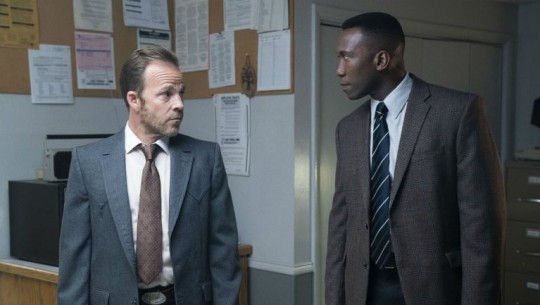
“I wanna know the whole story.”
The fourth True Detective episode usually features a big action scene that solidifies the halfway point in the story. The harrowing one-shot sequence in season one. The relentless shooting spree in season two. This is more of a prelude to this season's intense powder-keg separating the first half of the story from the second. It's another way that this new story toys with paying lip service to what came before while contenting itself with being its own thing.
What this does instead is take its sweet time in fleshing out what exactly is going on in each of the three timelines and the states of the characters as they exist within each of those eras. It sets the stage for what comes next in the season, while also being character and dialogue heavy. It also takes more time to explore the themes of the season, which I especially enjoyed.
Racial Divide
The issue of race is finally examined, which I feel the show has been dancing around until now.
I felt it was always in the background, noticeable in the lingering, guarded or just suspicious looks that are directed at Wayne Hays, the black detective in rural Arkansas. I've noticed it from the very first episode. Some people don't realize that prejudice is not always overt. In fact, I'd say a majority of it goes understated or unspoken, in that Travis Bickle sort of way.
The thing is most of the people who regard Hays in this way probably aren't even malicious about it, or would even consider themselves racist; I know people like this. You've got ones like state prosecutor turned Attorney General Daryl Kent who clearly looks down on Hays with this smug, dismissive superiority. Then you've got people like Mrs. Faber who will maintain politeness but always see him as an other, holding that look of thinly veiled fear and suspicion. Then there's guys like Tom Purcell, who'll drop racial slurs in moments of anger or frustration and then quickly feel ashamed; that reaction exists somewhere in their upbringing, but they know it's wrong.
No matter the shade in which it presents itself, there's no doubt it sticks in the craw of men as dignified as Hays.
Or men who aren't, as displayed when Hays and West pay a visit to Sam Whitehead, a possible lead on the one-eyed black man who bought the ominous dolls. Was his immediate rabble-rousing and accusations of racial profiling and witch-hunts just a natural reaction from an old black man who has experienced decades of injustice from white cops, or was it an easy way of avoiding direct answers to the questions he was asked? It's not entirely clear.
The hectic encounter with Whitehead and the other residents of that local ghetto did highlight the nuanced dynamic between Hays and West, which I've enjoyed throughout this season. While clearly a bit of a good ole' boy, West does not seem prejudiced. He even seems rather progressive for a man of his era, region and occupation, given his deep respect for his partner and stony admonition of Tom for his aforementioned drunken insult toward Hays. And Hays, while constantly on his toes about the racial divide between them, seems to recognize West's empathic quality, even enjoys it when West jokingly needles him about this sensitivity. It's another reason I dig this partnership, that understanding between two no-nonsense individuals.
Another character who appears not to be clouded by the resident race elephant is the priest at the Catholic church attended by the Purcells. Although West distrusts him on account of being a priest -- which would make even more sense today than in 1980 -- the man is very helpful in organizing his congregation to aid the detectives. He seems sincere in his assessment of Will and Julie and he hopes Hays, a former altar boy, would be open to confession. Nice guy, but there were certain things about his scenes that made me wonder if he might be involved in what happened to the kids.
Couples Counseling
More personal than societal, but equally important are the various relationships we are faced with in this story. It's heavily suggested that they have quite a bit of bearing on what's going on.
The big one is Wayne and Amelia's relationship. The contrast between their blossoming romance in 1980 and their rocky marriage in 1990 is very striking. We first see that the later stage is marred by feelings of resentment from Wayne and accusations of inadequacy from Amelia, despite the love they still share. After ten years, they've become worn down by the flaws and neurotic tendencies they seemed so excited about discovering at the start of their romance.
The first dinner date between Hays and Amelia was certainly the best scene in the episode. It was very cute, even sexy in a surprisingly subtle way. And their dialogue back and forth was just wonderful. Despite being so different in terms of background, occupation, politics and temperament, there was an instant chemistry that both recognized. Almost like these two people who each claim to have never wanted marriage or kids saw in each other the possibility of a future together in this first foray into intimacy.
Initially, though, there's Tom and Lucy Purcell. A couple whose furiously tumultuous marriage bred an unhappy family life, which may have played a factor in their children's secretive meetings with mysterious strangers and their eventual abduction.
Amelia gains an insight into this as she tries to comfort the distraught Lucy, and ends up getting the feeling that Lucy might be hiding something and ends up getting cursed out by the latter thanks addressing it. Not a very good first attempt at junior detective work, but she may have just unearthed a clue without realizing it. Lucy claimed that "Children should laugh", the same phrase included in the cryptic letter sent by Julie's abductor. Either Lucy was just wistfully acknowledging the logic of that message or it could be that she had something to do with what befell her children. It's still ambiguous.
As for Tom, we get to see the beginning of his and West's odd friendship as West gives the heartbroken Tom a place to stay away from his sad home. It's another indication that West is a naturally empathetic person, despite occasionally coming off as a hardass. Though it might be that his empathy has dampened somewhat in the years since.
It's a shame that the 1980 dynamic between Hays and West doesn't return when Hays is brought on board the task force of the second Purcell case ten years later. A shame, but realistic. No way the dynamic is the same after Hays got the shaft and West became the successful, award-winning career lawman who shook hands with young, pre-controversy Bill Clinton. And the fact that Hays, lead detective on the original case, is now expected to follow West's lead doesn't help. No-nonsense or not, old friends or not, pride asserts itself. To put it bluntly, dicks will inevitably be measured and pissing contested.
Haunted Houses
Now let's get more cerebral. The first season's tagline was "Touch darkness, and darkness touches you back", vey Nietzsche-like. That seems to be a constant theme throughout this series. The ways in which human horror and trauma can have dramatic effects on a person's sense of self and their reality. How they might serve as some explanation of what we see as the spiritual, supernatural and even paranormal.
It's introduced well-enough. Tom and Lucy Purcell feel trapped in their house, the place where the kids, the only thing that united them, were raised. Tom can't stay there, broken by their absence. And Lucy seems to stay in it as self-imposed prison for her failings as a mother. A disturbing situation where the place that is meant to be home feels more like hell.
The Hays household experiences a similar phenomena later, which Old Hays admits. He came to believe his unending obsession with the case infected Amelia and their children, sullying their chances at a stable, happy family. That he ended up cursing them with his own restless demons.
This takes on what could be a more literal meaning as Old Hays finds himself reminiscing on the past at the same time he struggles to beat back the ghosts in his mind. It's an incredibly haunting scene, watching him struggle to grasp the memories of his life as men he killed in Vietnam (and one caucasian man in a suit) close in and hover over him like phantoms, whispering, accusing. And the show has played so fast and loose with the line between psychologically unhinged experiences and what might be darker forces that exist on the fringes of existence. Rustin Cohle had his drug-induced visions which at times appeared to grant him insights into hidden otherworldly realms. Ray Velcoro's near death experience offered a bizarre yet prophetic glimpse into a possible afterlife. Now Wayne Hays' years of multi-faceted PTSD compounded by dementia conjure menacing ghosts from the past.
"Purple" Hays, indeed.
Escalating Confusion
But themes aside, the more concrete plot points are there as well.
In 2015, a dogged Old Hays enlists his son -- revealed to be an Arkansas State Police detective like his father once was -- in finding West to help him remember the details of the two Purcell cases. To my surprise, he tells Elisa Montgomery in their private meeting that the 1990 case haunts him most of all. Elisa informs him that she and her team of investigators discovered that the skeletal remains of Dan O'Brian, Lucy Purcell's cousin and suspect in both cases, were recently found in a drained quarry after he went missing around the time of the second case.
Which is interesting, because Dan O'Brian was already missing prior to 1990.
But Hays makes a possibly huge development in the second case when he spots a mysterious young woman who could very well be a grown up Julie Purcell on the security footage of the store where her prints were found.
Meanwhile, in 1980, Hays and West end up traumatizing Freddy Burns when his prints are discovered on Will's abandoned bike; I'd totally forgotten him drunkenly riding it at Devil's Den in the first episode.
The detectives and feds are drawn away from this obvious red herring when they catch wind of the redneck lynch mob advancing on Brett Woodard's home, who has prepared for this event with a military arsenal that's sure to deliver on the action spectacle we've all been waiting for.
Bits and Pieces:
* “The Hour and the Day” was co-written by David Milch, creator of Deadwood. This explains why the characters, dialogue and themes felt even richer than usual in this episode. Milch is almost as acerbic and literary as Nic Pizzolato, if not more.
* There's a framed picture of a brunette woman on West's desk in 1990. I'm betting that's Lori, the girl he was putting the moves on at the church.
* Hays sarcastically raising his hand during a briefing was another fun little callback to the first season.
* Not sure if it was explicitly stated before, but Kent, the state prosecutor in 1980, appears to have blatantly used the Purcell case to snag himself the Attorney General office. What a guy.
* Black Sabbath has been around since the late ‘60s. Seems kind of strange that a bunch of men in their 30s act as if it’s some strange new thing in the early '80s. Perhaps its mainstream recognition in my generation is simply coloring my perspective.
* During his ghostly encounter, Old Hays makes note of a dark sedan that is staking out his house.
Quotes:
Amelia (1990): Let go of me, Wayne. Hays (1990): Stop talking shit about me! Amelia (1990): Or what? Hays (1990): … Or I’m gonna start crying. Wasn’t expecting that.
Sam Whitehead: And you. How’re you gonna wear that badge? Hays: It’s got a little clip on it. Ha!
Hays: Can we say this was anonymous vandals? West: We’re not going with irate negroes?
Hays (1990): We ain’t doing any of that shit they just said, right? West (1990): Wasn’t planning on it.
Priest: Would you like to confess now? Hays: I reckon I’ll let it pile up a little more.
Hays: Thing of it is, Father, we’re about ninety percent sure that whoever took Julie or Will are one of yours. Priest: I find it difficult to believe that anyone here could something like that. Hays: They don’t exactly wear a signboard says “psycho killer.”
Four out of five Claymore mines.
Logan Cox
2 notes
·
View notes